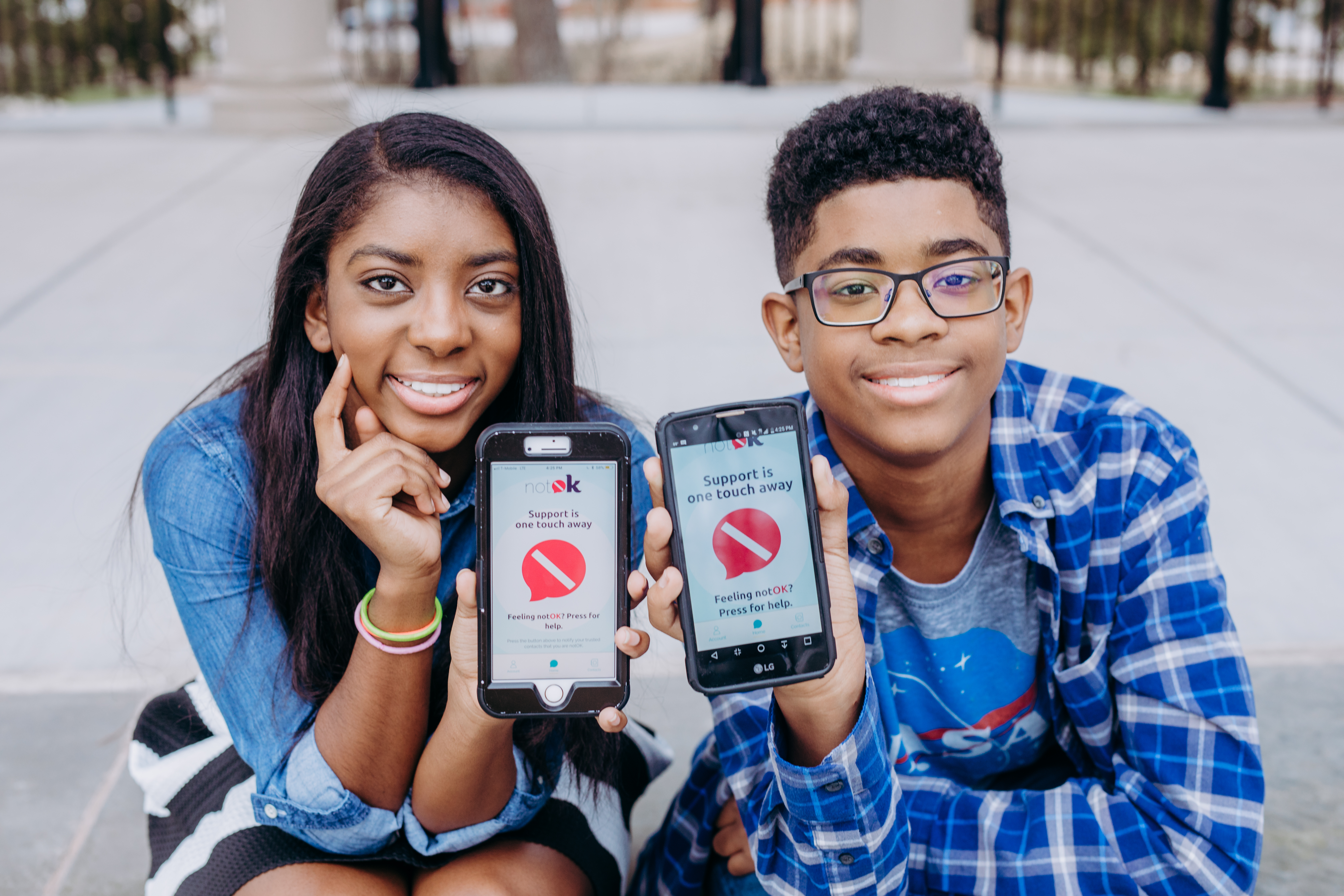These teens created an app to help those struggling with mental health

The world is struggling with a global epidemic of suicide. According to the World Health Organization, suicide is the second leading cause of death globally for 15- to 29-year-olds and is currently at record-breaking levels for students in high-income countries like the U.S. In fact, one recent U.S. government study found that suicides have been on the rise since 1999; the rate rose by 56 percent from 2007 to 2016.
Teenage siblings Hannah and Charlie Lucas (who are 16 and 13 respectively) decided to use technology to do something about it: They created the notOK app, which aims to help those in need of mental health assistance by summoning family, friends, and a network of peers for users in need of support. The notOK app received the 2018 Power Award from Mental Health America and is also endorsed by the Born This Way Foundation and the American Association of Suicidology.
Hannah Lucas spoke to the FBomb about how the ordeals she personally faced at a young age helped Charlie and her come up with the idea for their app and the hardships founders of color face in the generally homogenous environment of the tech industry.
The FBomb: Can you describe the process of developing the notOK app? How and why did you start it?
Hannah Lucas: When I was in the ninth grade, I started passing out. It became more and more frequent, and I was later diagnosed with POTS (Postural Orthostatic Tachycardia Syndrome). Kids at my high school didn’t understand what caused me to pass out so often so they bullied, sexually harassed, and threatened me. I began to spiral into depression and anxiety, which for me included self-harm, eating disorders, and a suicide attempt. That was by far the darkest moment of my life. I wished more than anything that I had an app that could instantly alert my friends and family that I was “notOK.” I told my brother, Charlie, about it and he immediately started to work on the workflow of the app. We pitched it to our parents, asking them to “invest in our future and the future of those around us” through this app. We ended up hiring developers because Charlie was only 12 by then and couldn’t create an entire app by himself yet, but Charlie worked alongside them through completion of the final product.
Have you been able to keep track of the people this app has reached? What kind of feedback have you gotten from users?
We don’t have an intake form, meaning we don’t collect data from our users. People do, however, reach out to us, telling us the impact notOK has had on their lives. Most recently I was checking the reviews on the app store and this one person posted about how notOK actually saved her daughter’s life the previous night. It was an amazing feeling to know that my pain and suffering became something that is actually preventing people from going through what I went through.
Mental Health America, the Born This Way Foundation, and the American Association of Suicidology have all endorsed the notOK app. What does this mean for your app and how has it affected the app itself and/or your work with it?
These endorsements come in handy when we pitch to potential sponsors so they see us as more than “just kids” who deserve a little pat on the back. I guess it gives them more confidence in our app. With our partnership with MHA, we're working on an update to include their mental health screenings within our app so people can do the screening and take the results to their physicians to get the conversation started around their mental health.
Other countries (like Japan, Sweden, Finland, and Brazil, to name a few) are struggling with high rates of youth depression and suicide. Do you have plans to make your app international? If so, do you think the way you've designed your app for Americans would be applicable to other countries and cultures?
We hope to see notOK being used globally soon. We are currently working on different translations so there won’t be any language barriers. And I believe that despite coming from different corners of the world, deep down we are similar when it comes to struggling with mental illness. We all want help, we all want to get better, we all struggle to break free of cultural and social stigmas on mental health, so if notOK is effective in America, why not the rest of the world?
The tech world is notoriously dominated by white men. How do you believe your identities shaped your experience creating this app?
It motivates my brother and I to this day, not just because we’re African Americans in a predominantly white field, but also because of our young ages. We have to work two or three times as hard in order to be recognized as equal, and that teaches us a great work habit, so when we get older nothing can stop us.
Do you have any advice for other young entrepreneurs, especially those of color and/or other marginalized backgrounds?
Be careful who you look up and how you look up to them; there is a difference between admiration and comparison. Admiration is a healthy view of others that motivates people to do better. Comparison is the unhealthy view of others in contrast to your life that takes a major toll on your mental state.
More articles by Category: Science and tech
More articles by Tag: African American, Black, Intersectionality, Women of color



























